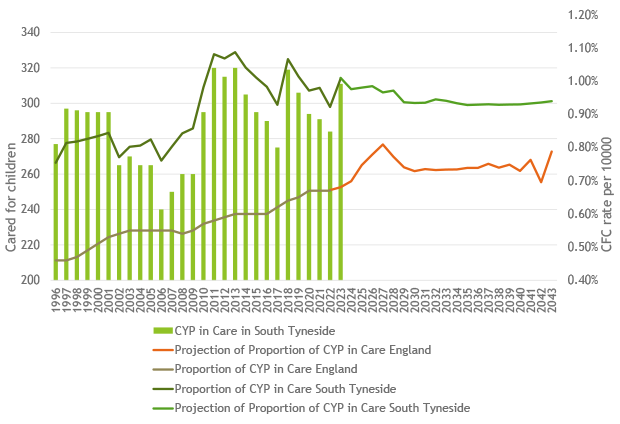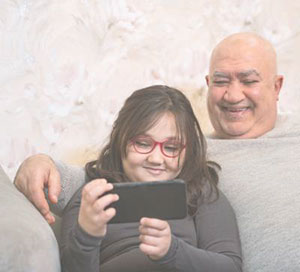Cared for and Care Experienced Children and Young People Sufficiency Statement 2023-2027
Published October 2023 An accessible document from southtyneside.gov.uk
Introduction
The South Tyneside Health & Wellbeing Strategy explains how the Council aims to “Give every Child and Young Person the Best Start”. This statement explains how the Council and partners will work together to achieve this in the context of Children’s Social Care. This includes ensuring that families are supported to stay together or alternative permanent homes for children are found, if necessary.
Furthermore, we recognise that while most children and young people in South Tyneside are raised in their own families, a small number require additional services and support. We will work tirelessly to ensure that children live and are cared-for in the most appropriate setting for them, which for most will be family-based and local. We aspire to provide a choice of high-quality provision for all children that is designed around their needs and wishes, so that they grow into independent, healthy, and successful adults. This is a ‘live’ document and will be reviewed annually to ensure that it remains current and effective in meeting the needs of our Cared for Children.

The Sufficiency Duty
The Children Act 1989 requires local authorities to have a strategy in place to provide sufficient care placements for children in care, known as Cared for Children. The introduction of the Sufficiency Statutory Guidance (2010) and the Care Planning, Placement and Case Review Regulations (implemented in April 2011) further clarified the requirements for local authorities to secure appropriate and sufficient placements for these children.
The Statutory Guidance emphasises the importance of local authorities working with key partners to secure, where reasonably possible, accommodation that meets the needs of children in care and is located within the local authority’s area. It also stresses that the provision of sufficient accommodation should not only be measured by the number of beds available, but also by the availability of a range of providers and services that can meet the diverse needs of these children.
Furthermore, the Guidance lays out commissioning standards for securing sufficient accommodation for children at risk of care or custody, also known as children on the edge of care. This is crucial as it aims to provide support and prevent the need for these children to become children in care, if it is in the best interest of the child.
Links to Strategic Frameworks
Our strategy will uphold and progress - where appropriate - the principles and priorities in both the South Tyneside Vision and the South Tyneside Health and Wellbeing Strategy.
For example, one of the outcomes within the Health & Wellbeing Strategy is “Giving every Child and Young Person the Best Start” which in practice means; Every child and young person, regardless of their background, is provided with the opportunity to thrive and reach their full potential.
Some of the key groups we will work with to achieve this are:
- Best Start in Life Alliance
- Children and Young People’s Mental Health and Wellbeing Alliance
- Early Help Network Consortium
- Children and Adults Safeguarding Partnership
- SEND Leadership Board
Current Context
The current context for Children’s Services in South Tyneside is one of increasing pressure due to the number of children in care, children presenting with more complex needs and financial pressures. The proportion of Cared for Children is higher than the national average, indicating a higher baseline of need. This places increasing demands on us and our partner organisations to provide support and care for families.
The sufficiency of markets to meet demand is a growing concern, with issues related to quality, instability of placements and a lack of alternative move on and step down support. Private and independent provision is playing an increasing role in fostering and residential markets, with escalating costs and an increasingly fragile financial position for service providers.
An Ofsted inspection in 2022 found South Tyneside Children’s Services to be ‘inadequate’ in areas of leadership, the experience of children in care and care leavers, and overall effectiveness. The Counci l has since successfully accessed funding to undergo a rigorous improvement drive.

Summary of Needs Assessment
Cared for Children Trend South Tyneside vs National

- Trend and demographic data indicate a continued plateauing of Cared for Children in South Tyneside
- For the levels of recorded deprivation, South Tyneside has roughly the amount of Cared for Children you’d expect when compared nationally
- However, the last two years have seen an increase in the number of older aged children entering care
| 311 Cared for Children (1.01% of all CYP) |
| 6% of CfC are Seeking Asylum |
| Average age of CfC = 10 (10.4 nationally) |
| 179 Foster Care Placements (96 of those via IFAs) |
| Average age CfC enter care = 7.8 (6.8 nationally) |
| ~17% of CYP in South Tyneside have complex needs |
| 93% of Care Leavers in suitable accommodation |
| 311 Cared for Children (1.01% of all CYP) |
| 65% in same placement for >2 years (70% nationally) |
| 41 CfC in Residential Children's Homes |
| 10% CfC with 3+ placements in 1 year (10% nationally) |
| >50% CfC ceased to be cared for to live with family/friends |
| 57% of Children's Homes places <20 miles |
| ~30% referrals due to DV and/or MH of parent |
| 4.8% CYP in South Tyneside have an EHCP (4% nationally) | As of March 2023 |

Children & Young People Say:
- They find moving into a new home a difficult experience
- They need to understand why they came into care
- They need to be able to build relationships with adults they can trust
- They rely on the adults caring for them to help keep them safe
- They require support to maintain relationships once they left care, on an informal basis
- They want professionals who provide support to have high aspirations for them
- They report that leaving care still feels like a ‘cliff edge’
- They feel that the process of leaving care itself is often rushed and that planning for leaving care should start earlier
- They want more choice about where they live and who supports them
Our Approach

Family Help and Adolescent Services is a diverse portfolio comprising statutory and non statutory services. The provision offered is predominantly targeted. Following restructure, the service launched a new configuration of services in December 2022. Simultaneously, the service implemented new projects and devised new frameworks to support partners to keep children, young people and families safe from harm.
South Tyneside take a proactive and comprehensive approach to addressing domestic abuse, especially as it is a key element of the Violence Against Women and Girls (VAWG) agenda. To address this issue, we have established a Local Domestic Abuse Partnership Board (LDAPB) that, specialises in directing a response to and providing support for victims.
As part of the “Best Start in Life” programme, a network of Family Hubs were opened in April 2023. The hubs provide access to a broad range of universal, targeted and specialist services offering information, advice, and support for families with teams located at venues across the Borough, enabling families to access the right support at the right time.
Early Intervention & Prevention
Services:
- Youth Justice Service
- Family Hubs
- Early Help Family Support
- Youth Services and Outdoor Education
- Asylum, Refugee and Migrant Community
- Integration
- STANLEYs Childcare
- Connexions
- Matrix Drug and Alcohol Service
- Holiday Activities and Food programme
- Educational Advisory Trips Service
Support to Remain at Home
Impact of Edge of Care Service:
| 380 referrals since 2017 (327 accepted) | |
| 290 unique CYP | |
| <10% CYP became CfC during involvement |
We are committed to supporting children and families to stay together whenever it is safe to do so. We understand that preventing problems from developing early on is better for children and their families, therefore, we are constantly monitoring front door activity and referrals to tailor projects to specific cohorts and causal factors.
Approximately 17% of children in South Tyneside are identified as having complex needs in at least one of the key areas of; education, health and care, which is much higher than average. To effectively address these needs, we will work closely with our partners to ensure that a comprehensive support system is in place. We have also seen increased need for support services to work in family homes. This is an area we are keen to progress by engaging with providers to develop a support offer.
For families at risk of ‘breakdown’, our Edge of Care service provides a range of interventions including direct work with children and families, parent groups, activity-based interventions for young people, Triple P and Healing together. The service also offers family time facilitation and family mediation. Our plan is to expand our Edge of Care provision and we’re currently reviewing model to identify suitable next steps.
Child Sexual Exploitation (CSE) & Young People at Risk of Criminal Exploitation (YARC):
CSE can have devastating consequences for vulnerable young people. Within the space of 1 year, approximately 60 referrals are made regarding young people at risk of CSE. In response to this issue, the Council has implemented several measures to protect cared for children from CSE:
- Providing training and education to all staff and foster carers on the signs and indicators of CSE
- Closely monitoring and supervising Cared for Children who may be at higher risk of CSE
- Collaborating with other agencies and organisations, such as the police and local youth organizations
- Providing specialised support and services for children who have been affected by CSE
Similarly, South Tyneside is committed to protecting young people from the dangers of organised crime. We recognize that young people can be targeted and groomed by criminal groups for various illegal activities. We work closely with our partners in law enforcement to disrupt criminal networks that target young people. We also aim to take a proactive approach to preventing young people from involvement in organised crime by providing support services, such as; mentoring programs, educational and vocational training, and support for families at risk of criminal involvement.
Local, Family Placements
Internal Foster Care Capacity:
| 59 Fostering Households | |
| 121 Approved Places | |
| 105 CfC | |
| 4 Mockingbird constellations >20 placements |
Most children in South Tyneside will live in a local, family placement which minimises the disruption to their education or training. To achieve this, we aim to increase the proportion of children living with friends, family, connected people and foster carers.
We are currently investing in our in-house fostering service and recently expanded to the fourth constellation of our hugely successful Mockingbird fostering model – a service strength highlighted by Ofsted. As a Fostering Service we support via our Out of Hours & Community Foster Carers, in addition to the use of Mainstream & Mockingbird Fostering. Recruitment efforts will be geared towards securing specialist placements, such as placements for sibling groups and parent & child. South Tyneside is currently working with the other Northeast local authorities and DfE on a regional pathfinder on recruitment and communication.
Furthermore, we acknowledge that we do need to use Independent Fostering Agencies (IFAs), South Tyneside support this partnership work with regular IFA Connect Meetings and a training offer. We will work to secure best value and quality, whilst reducing reliance on residential provision.
Connected Care Pledge
The Children and Young Persons Act 2008 explicitly mandates authorities to consider living arrangements with kin as a “first option” for children in care, strengthening the duty from the Children Act 1989. W hen compared to other Local Authorities, the rates of familial arrangements in South Tyneside are relatively low, this is in part due to successes in achieving permanence for children with those they’re connected to via Special Guardianship (SGO) and Child Arrangement Orders (CAO). Over time, the use of Kinship Foster Care has started to be preferred; Connected care now makes up for roughly 20% of all Foster Care placements. Clarity around permanence planning
We recognise our duty to consider whether anyone who is connected to the child may be in a position to care for them and determine if this is a safe, viable option that’s in the child’s best interests. One key area South Tyneside has strengthened is around support; both pre and post a SGO or CAO being granted. This is key to placement sufficiency and something we are very much focussing on in the immediate future.
Our commitment and approach regarding sufficiency within the context of kinship/connected care is underpinned by our commitment to timely and high quality assessments, making best use of Family Group Conferences and Family Network Meetings, etc. in order to achieve timely permanence for children and securing them with those people who are arguably best placed to promote their identity and enable children to maintain links with their birth family.
Residential Children’s Homes
Financial stats:
| Average cost of in-house £163k pa | |
| Average cost of OOB £224k pa | |
| Highest package >£20k per week | |
| Investment in new provision represents £88k pa saving per CYP |
It is our responsibility to provide appropriate placements, including for those who require residential care. Our goal is to maintain a sufficient supply of residential placements while reducing the number of out-of-borough placements to minimize disruptions to children’s education and social connections. Currently, approximately 9% of children in our care are placed in residential settings, which is far lower than the national average of 17%. While some of these placements are within the region, a significant portion are located outside of our area.
South Tyneside currently has 4 in-borough residential homes, which accommodate children and young people with a range of needs. Preliminary works have started to increase supply at Seton Avenue in South Shields for a new Assessment Centre (2 beds). Work on a new home in Jarrow (4 beds) will start in 2023, followed by a further children’s home in Hebburn New Town (4 beds). Both sites will also have 1 place available for Care Experienced Young People to live as part of the ‘Staying Close’ arrangement. Likewise, we’re continuously seeking opportunities to develop homes tailored to the needs of our children and young people. Outreach and short break care, for children aged between 7 and 18, will continue to be provided by Foxden in a specially-adapted bungalow.
Good Quality Provision
Cared for Children are a particularly vulnerable group and are at high risk of social exclusion, health inequalities, inequalities in educational attainment, and wider negative outcomes. To ensure that we place Care for Children & Care Experienced in the most appropriate placements available, we must understand their needs and capture their views effectively. This will also help prevent and reduce the risk of placement breakdown. We aim to only place our children in facilities judged as ‘good’ or ‘outstanding’ by Ofsted and aim to secure the most appropriate placements as quickly as possible.
To support children and young people in having placement stability and the most opportunities to achieve positive outcomes, we will:
- Continue to invest in commissioning resources to improve market analysis and management
- Explore sub regional collaboration
- Implement a market review programme that listens to the voice of the child and young person to drive up quality
- Co produce a model that will evaluate the impact of interventions in order to identify the ‘right’ support for those with the most complex needs
Reunification & Permanence
Statistics:
| 71 CfC achieved permancence via an SGO or CAO (2021-23) | |
| As of 2023, ~38% of CFC exit care via a SGO or CAO | |
| >5% of CfC are placed for adoption |
For young children who come into care, our priority is to work towards reuniting them with their birth or extended families whenever it is deemed safe to do so. To support this, we have increased management oversight of decisions and will develop and implement a comprehensive reunification plan for each child that includes clear goals, timelines, and strategies to address any barriers to reunification. This approach emphasizes the importance of involving children and young people in the process, preparing families, and providing ongoing support for both children and families. Additionally, we will provide ongoing support to families during and after the reunification process to ensure the best possible outcome for the child.
When reunification is not possible, we strive to provide permanency through adoption or SGOs or CAOs. South Tyneside is part of a regional partnership, ‘Adopt North East’, which provides services on behalf of 5 LAs and works to find forever families for children and provides ongoing support to adoptive families, those adopted and those affected by adoption. We have also improved support for our Special Guardians; between 2021-23, 71 CFC achieved permanence via SGO or CAO (38% of all CfC exiting care), this alludes to our shift in focus and pledge to maintain children where they have connection.
Preparation for Adulthood
What is 'Staying Close?'
Staying Close extends the period of support for Young People leaving residential care, giving them more time to prepare and to determine the right time for them to live independently, in a similar way to ‘Staying Put’ for Young People in Foster Care.
Young people approaching adulthood need support making that transition. However, a recent inspection found that South Tyneside lacked a formal accommodation pathway, and we are currently working to improve our offer for Care Experienced YP. Processes are currently under review to ensure a seamless transition and CYP are no longer waiting until adulthood to achieve permanence. This work is supported by our ‘Staying Close’ agenda. Furthermore, fortnightly interfacing meetings and a permissive use of the care act have facilitated a much more flexible approach to transitions and we’re seeing a positive shift in finding permanence. Moreover, a new supervision model means Social Workers are supervised by Leaving Care Practice Managers for better alignment processes and identification of options.
We acknowledge the lack of a menu of options for Care Experienced Young People; as such, w e are developing a joint protocol with South Tyneside homes to provide pr operties and reduce risk of homelessness. Additionally, there are 5 providers within South Tyneside that deliver supported accommodation for vulnerable young people. We are in routine discussions with our current providers to ensure minimal disruptions to delivery
Housing Protocol for Care Experienced Young People
At South Tyneside, we have a commitment to offer homes and support to all Young People leaving care. Our Personal Advisers ensure emotional and practical support through this process till age 25, and beyond if needed.
Core Services
- Housing Assistance
- Depaul Jigsaw Floating Support: support for independent living, accessing training & employment, etc.
- Key Project: Offers support, mediation, floating support, and housing units.
- Places for People: Flats across South Tyneside, parent accommodation with child safeguarding, and community homes.
Additional support available includes; support if leaving custody, homelessness help and rough sleeping assistance, HAPPS Panel tracking for young people in supported housing and dispute resolution. More information on what is available can be found via our local offer
Next Steps

Action Plan (12-24 months)
The Council recognises that to effectively meet the sufficiency duty it needs to:
- Understand the level of existing demand for specific types of provision per the needs of children, including the amount and type of supply that currently exists.
- Know our forecast for future demand and how we are going to plan to manage this within the current resource and overall budget priorities.
- Understand the appetite and development capacity of our local providers including their business expansion plans.
- Strengthen our relationships with the market, other stakeholders and partners to ensure we find the best possible homes that meet the identified needs of our cared for children and care leavers.

Actions
 |
Early Intervention & Prevention
|
 |
Support to Remain at Home
|
 |
Local, Family Placements
|
 |
Residential Children’s Homes
|
 |
Good Quality Provision
|
 |
Re-Unification & Permanence
|
 |
Preparation for Adulthood
|